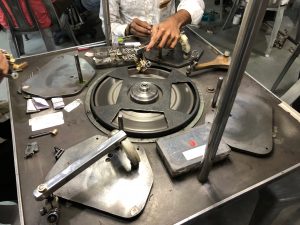On the Diamond Trail in India
Changing Attitudes to Responsible Sourcing
Anyone who has witnessed traffic in Mumbai would agree that it is indicative of general attitudes to health and safety in India. It looks a little something like this: drivers, to the sound of loud honking, ruthlessly push ahead in what appear to be at least five lanes of constantly changing traffic; pedestrians, hoping for the best, cross the street by fearlessly diving into this moving flow of cars, buses, bikes, lorries, rickshaws and sometimes wandering livestock.
As I watched these kinds of street scenes during my recent business trip to the country, I realised that local people are much more accustomed to taking risks in their everyday lives. Therefore, changing people’s thinking about issues like health and safety and implementing internationally recognised responsible sourcing standards in the Indian manufacturing industry will require a sustained and concerted effort.
To learn more about RCS Global’s work in improving precious metal supply chains click here.
I was part of a RCS team that travelled to India last month to support a global mining company put in place an innovative chain of custody programme for diamonds. The programme traces packets of diamonds from their origin as they pass through various stages of manufacturing until they are studded into jewellery. This gives assurance to end customers regarding the provenance of the diamonds and their natural origin. To add assurance around responsible sourcing, the programme is now introducing a responsible sourcing standard based on the Responsible Jewellery Council’s Code of Practices with health and safety requirements being key. Our role was to visit several factories that are participating in the programme in Mumbai, Surat and Bhavnagar. This was to understand the degree to which these entities are able to meet the new responsible sourcing requirements.
When visiting diamond cutting and polishing factories, we noted that many of them are part of an informal industry where health and safety conditions, and other responsible sourcing standards, are generally low. This is astonishing given that over 90 percent of global diamond cutting and polishing is done in India with around 600,000 workers currently employed by the industry. We observed many health and safety conditions that were not in line with the programme’s requirements and a general lack of management systems that would facilitate compliance with the standard. But there is now a move by certain industry leaders to drive improvements.

The media and key international NGOs must be given credit for helping to bring about some of this change in perspective. Given that scrutiny of jewellery supply chains increases over time, companies will be exposed to more and more reputational risks if the conditions in their supply chain fail to meet international responsible sourcing standards like the OECD Due Diligence Guidance, and the Responsible Jewellery Council Code of Practices. A recent report published this month by Human Rights Watch is a case in point. It assesses 13 major jewellery companies on their human rights due diligence practices with respect to their gold and diamond supply chains. The report calls on companies to do more to put in place responsible sourcing standards and publicly report on their implementation.
But while there are risks, there is also a tremendous opportunity for companies to collaborate across the supply chain to create systemic change and enable positive social, environmental and economic impacts. In the case of the Indian diamond manufacturing industry, this will require long term focus and activities to change supplier attitudes and capacity to implement global responsible sourcing standards.
To this end, companies both upstream and downstream in the Indian diamond supply chain can:
- Collaborate on developing best-in-class due diligence programmes that are aligned with international responsible sourcing standards and good practices;
- Establish chain of custody systems that provide assurance of responsible sourcing as well as provenance;
- Adopt a continuous improvement approach to build the capacity of suppliers to implement responsible sourcing standards and improve their performance over time;
- Create innovative ways of monitoring conditions in the supply chain, for example, direct worker engagement on health and safety conditions and other responsible sourcing aspects through mobile application surveys and grievance mechanisms.
- Measure the outcomes and impacts of their responsible sourcing efforts, and publicly report on them.
At RCS Global we are supporting companies across the jewellery supply chain in implementing robust due diligence systems and responsible sourcing practices through advisory and audit services. We also offer block chain-backed technology solutions for traceability and due diligence of minerals in the jewellery supply chain. We look forward to continuing our work to raise standards and create positive impacts in the Indian diamond manufacturing industry.
Quick read: RCS Primer on the Human Rights Watch report on precious metals supply chains
Alice Valvodova is a Project Director at RCS Global